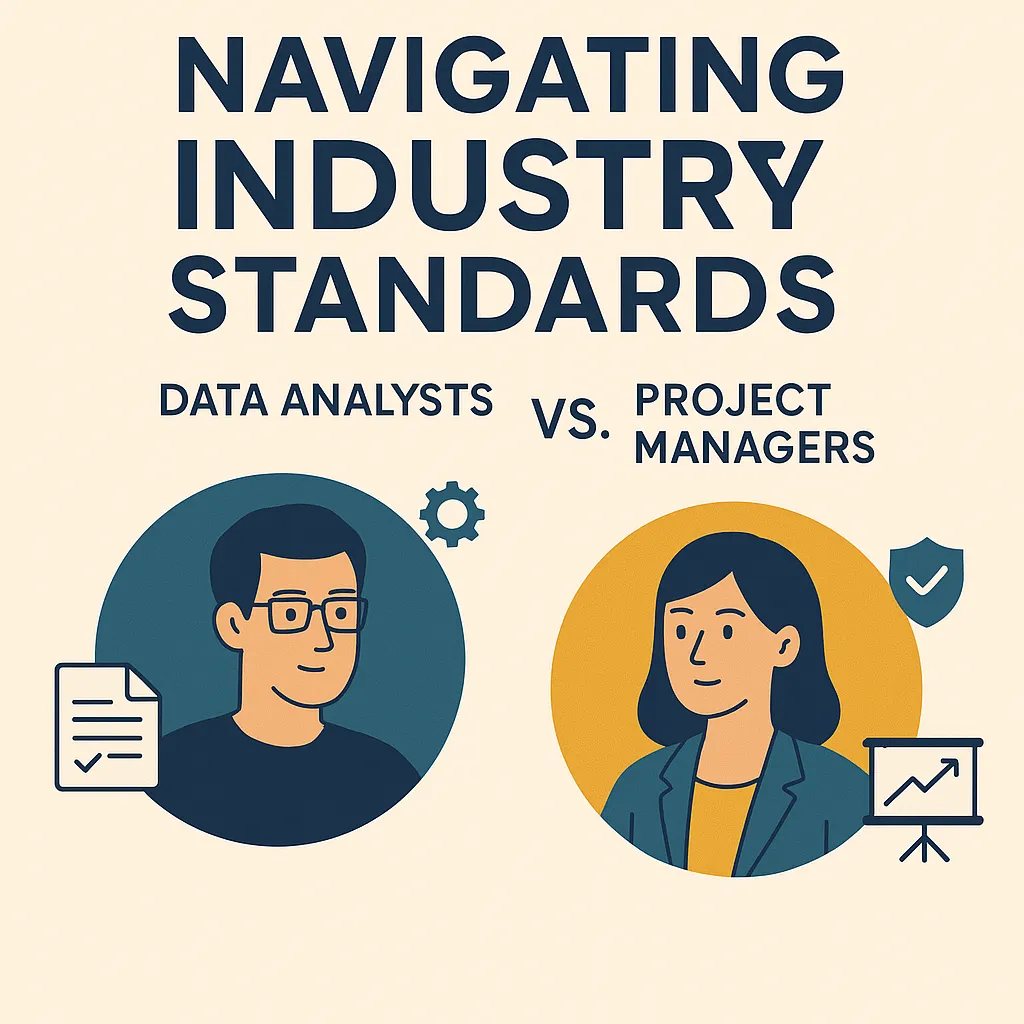Introduction
The roles of data analysts and project managers have become increasingly vital. Both positions contribute significantly to the success of projects, yet they operate within distinct frameworks and responsibilities.
Defining the Roles:
- Data Analysts are primarily tasked with collecting, organizing, and analyzing data to derive actionable insights. They play a crucial role in interpreting data trends and patterns, which can inform strategic decisions and enhance operational efficiency [1][6].
- Project Managers, on the other hand, oversee the planning, execution, and completion of projects. They are responsible for managing resources, timelines, and stakeholder expectations, ensuring that projects are delivered on time and within budget [1][5].
Importance of Understanding Industry Standards and Regulations:
Understanding industry standards and regulations is essential for both data analysts and project managers. Compliance with these regulations not only ensures legal adherence but also enhances the credibility and reliability of the data and processes involved. For data analysts, industry standards guide the methodologies used in data collection and analysis, ensuring that the insights generated are valid and applicable. For project managers, regulations dictate the frameworks within which projects must be executed, influencing everything from risk management to stakeholder communication [2][11].
Overview of How Regulations Impact Both Roles Differently:
The impact of industry regulations on data analysts and project managers varies significantly. Data analysts must navigate regulations related to data privacy, security, and ethical data usage, which can affect how they collect and analyze data. Compliance with standards such as GDPR or HIPAA is crucial, as it shapes the data handling processes and methodologies they employ [3][12].
Conversely, project managers are often tasked with ensuring that their projects comply with broader industry regulations that govern project execution, such as quality standards, safety protocols, and financial regulations. This requires them to integrate compliance considerations into project planning and execution, ensuring that all aspects of the project align with regulatory requirements [4][10].
Understanding the Roles
The roles of data analysts and project managers are distinct yet complementary. Each plays a vital part in ensuring project success, particularly in industries governed by strict regulations. Below is a detailed description of each role, along with a comparison of their skills and tools.
Responsibilities of a Data Analyst
Data analysts are primarily focused on interpreting and analyzing data to derive actionable insights. Their responsibilities include:
- Data Collection and Cleaning: Gathering data from various sources and ensuring its accuracy and relevance. This step is crucial for compliance, as data integrity is often mandated by industry regulations.
- Data Analysis: Utilizing statistical methods and tools to analyze data sets, identifying trends, patterns, and anomalies that can inform decision-making.
- Reporting: Creating comprehensive reports and visualizations to communicate findings to stakeholders, including project managers and compliance officers. This ensures that all parties are informed about data-driven insights that may affect project direction.
- Collaboration: Working closely with project managers to translate data insights into actionable strategies, ensuring that project goals align with regulatory standards and organizational objectives.
Responsibilities of a Project Manager
Project managers are responsible for overseeing the planning, execution, and completion of projects. Their key responsibilities include:
- Project Planning: Developing detailed project plans that outline objectives, timelines, resources, and budgets. This includes ensuring that all project activities comply with industry regulations.
- Team Coordination: Leading and coordinating project teams, assigning tasks, and ensuring that team members are aligned with project goals and compliance requirements.
- Stakeholder Communication: Acting as the primary point of contact for stakeholders, including clients and compliance officers, to ensure that their needs and expectations are met throughout the project lifecycle.
- Risk Management: Identifying potential risks related to project execution and compliance, and developing strategies to mitigate these risks. This is particularly important in regulated industries where non-compliance can lead to significant penalties.
Comparison of Skills and Tools
While both roles require a unique set of skills and tools, there are notable differences:
Skills:
- Data Analysts: Proficient in statistical analysis, data visualization, and data manipulation. They often possess strong analytical skills and a deep understanding of data management principles.
- Project Managers: Skilled in project planning, resource management, and team leadership. They excel in communication and negotiation, ensuring that all project aspects are aligned with compliance standards.
Tools:
- Data Analysts: Commonly use tools such as SQL, Python, R, and data visualization software like Tableau or Power BI to analyze and present data.
- Project Managers: Utilize project management software such as Microsoft Project, Asana, or Trello to plan, track, and manage project progress, ensuring compliance with industry regulations.
Industry Standards and Regulations
Industry standards and regulations play a crucial role in shaping the responsibilities and practices of professionals in these fields. Understanding these standards is essential for compliance officers and project managers, as they navigate the complexities of data handling and project execution.
Overview of Key Industry Standards
Several key industry standards are relevant to both data analysis and project management, influencing how organizations operate and manage data:
- General Data Protection Regulation (GDPR): This regulation governs data protection and privacy in the European Union and the European Economic Area. It mandates strict guidelines on data collection, processing, and storage, impacting how data analysts handle personal information and how project managers oversee projects involving data usage.
- Health Insurance Portability and Accountability Act (HIPAA): This U.S. regulation sets the standard for protecting sensitive patient information. Data analysts in healthcare must ensure compliance with HIPAA when analyzing patient data, while project managers must implement processes that safeguard this data throughout project lifecycles.
- Payment Card Industry Data Security Standard (PCI DSS): This standard is crucial for organizations that handle credit card transactions. Data analysts must ensure that any data analysis involving payment information complies with PCI DSS, while project managers must oversee projects that involve payment processing to ensure adherence to these standards.
Examples of Regulations Impacting Data Handling
The impact of regulations on data handling is significant, as they dictate how organizations must manage sensitive information:
- GDPR requires organizations to obtain explicit consent from individuals before processing their data, necessitating data analysts to implement robust data governance practices. Project managers must ensure that all project activities comply with these consent requirements, which can affect project timelines and deliverables.
- HIPAA mandates that healthcare organizations implement safeguards to protect patient data. Data analysts must be trained in handling protected health information (PHI), while project managers must ensure that all project team members are aware of and comply with HIPAA regulations.
- PCI DSS outlines specific security measures that organizations must implement to protect cardholder data. Data analysts must be aware of these requirements when analyzing transaction data, and project managers must ensure that all project activities involving payment data adhere to PCI DSS standards.
The Role of Compliance in Project Management
Compliance is a critical aspect of project management, particularly in industries subject to stringent regulations. Project managers must:
- Integrate Compliance into Project Planning: Compliance considerations should be integrated into the project planning phase to ensure that all regulatory requirements are met from the outset. This includes identifying relevant regulations and establishing processes to adhere to them throughout the project lifecycle.
- Foster a Culture of Compliance: Project managers should promote a culture of compliance within their teams by providing training and resources related to industry standards. This helps ensure that all team members understand their responsibilities regarding data handling and regulatory adherence.
- Regularly Evaluate Compliance: Ongoing evaluation of compliance with industry standards is essential. Project managers should implement regular audits and assessments to identify potential compliance gaps and address them proactively.
Impact of Regulations on Data Analysts
Data analysts play a crucial role in interpreting data to inform strategic decisions. However, their work is significantly influenced by industry regulations, particularly those related to data privacy and compliance. Here are some key points to consider regarding how these regulations impact data analysts:
- Influence of Data Privacy Laws: Data privacy laws, such as the General Data Protection Regulation (GDPR), impose strict guidelines on how organizations collect, store, and process personal data. For data analysts, this means that their data collection and analysis processes must be designed to ensure compliance with these regulations. Analysts must be well-versed in these laws to avoid legal repercussions and ensure that their analyses do not violate individuals’ privacy rights [1].
- Necessity for Data Accuracy and Compliance in Reporting: Regulations often require organizations to maintain high standards of data accuracy and integrity in their reporting. Data analysts must ensure that the data they work with is not only accurate but also compliant with relevant regulations. This necessity can complicate their work, as they must implement rigorous data validation processes and be prepared to justify their methodologies and findings to regulatory bodies [2].
- Challenges in Adhering to Industry Standards: Data analysts face several challenges in adhering to industry standards. The rapid pace of regulatory changes can make it difficult for analysts to stay updated on the latest requirements. Additionally, the complexity of regulations can lead to confusion about compliance obligations, which may hinder the analysts’ ability to perform their roles effectively. Analysts often need to invest significant time in understanding these regulations and adapting their practices accordingly, which can detract from their primary focus on data analysis [3].
Impact of Regulations on Project Managers
Compliance with industry regulations is not merely a checkbox; it is a fundamental aspect that can significantly influence the success of a project. Project managers play a crucial role in ensuring that their projects adhere to relevant laws and standards, which can vary widely across different industries. Here are some key points to consider regarding the implications of industry regulations for project managers:
- Ensuring Compliance: Project managers are tasked with understanding and implementing compliance frameworks that align with both internal policies and external regulations. This involves a thorough review of applicable laws, such as the General Data Protection Regulation (GDPR) for projects involving personal data, or the Health Insurance Portability and Accountability Act (HIPAA) in healthcare projects. Failure to comply can lead to severe consequences, including financial penalties and reputational damage [3][4].
- Shaping Project Planning and Execution: Regulations significantly shape how projects are planned, executed, and delivered. Project managers must integrate compliance considerations into every phase of the project lifecycle. This includes conducting risk assessments, developing compliance checklists, and ensuring that all team members are trained on relevant regulations. By doing so, project managers can create a robust framework that not only meets regulatory requirements but also enhances project efficiency and effectiveness [1][2].
- Risk Management Strategies: Effective risk management is essential for navigating the complexities of compliance. Project managers must identify potential compliance risks early in the project and develop strategies to mitigate them. This may involve regular audits, stakeholder engagement, and the establishment of clear communication channels with regulatory bodies. By proactively managing compliance risks, project managers can safeguard their projects against legal pitfalls and ensure smoother execution [2][9].
Collaboration Between Data Analysts and Project Managers
The collaboration between data analysts and project managers is not just beneficial; it is essential. As organizations navigate complex regulatory landscapes, the interplay between these two roles becomes increasingly significant. Here are some key points that highlight their collaboration:
Supporting Project Managers with Data-Driven Insights
Data analysts play a crucial role in supporting project managers by providing data-driven insights that inform decision-making. Their expertise in analyzing numerical results and trends allows project managers to understand the implications of data on project outcomes. For instance, data analysts can help project managers identify compliance risks by analyzing historical data and predicting potential issues before they arise. This proactive approach enables project managers to implement strategies that align with industry regulations, ensuring that projects remain compliant and on track [1][8].
The Significance of Communication and Teamwork
Effective communication and teamwork are vital in compliance-related projects. Data analysts and project managers must work closely to ensure that data insights are accurately interpreted and applied to project goals. Clear communication helps bridge the gap between technical data analysis and practical project management, allowing both roles to align their objectives. Regular meetings and collaborative tools can facilitate this communication, ensuring that both parties are on the same page regarding project scope, requirements, and compliance standards [2][11].
Case Studies of Successful Collaborations
Several organizations have successfully demonstrated the power of collaboration between data analysts and project managers in compliance contexts. For example, a financial institution faced challenges in adhering to new regulatory requirements. By fostering a collaborative environment where data analysts provided real-time insights into customer behavior and transaction patterns, project managers were able to adjust their compliance strategies effectively. This partnership not only ensured compliance but also improved overall project efficiency and stakeholder satisfaction [3][6].
Another case involved a healthcare organization that needed to comply with stringent data privacy regulations. Data analysts worked alongside project managers to analyze patient data while ensuring compliance with HIPAA regulations. Their collaboration led to the development of a robust data governance framework that safeguarded patient information while allowing for insightful analysis that improved patient care outcomes [4][10].
Future Trends in Compliance and Project Management
Both data analysts and project managers must navigate a complex web of industry regulations that impact their roles in distinct ways. Here are some key trends that are shaping the future for both professions:
1. The Evolution of Compliance Regulations and Their Impact on Data Practices
- Increased Regulatory Scrutiny: Compliance regulations are becoming more stringent, particularly in high-risk industries. This evolution necessitates that data analysts enhance their data governance practices to ensure adherence to regulations like GDPR and other global frameworks. The need for robust data management systems is paramount, as organizations face significant penalties for non-compliance [5].
- Data-Driven Compliance: The trend towards data-driven decision-making is gaining traction. Data analysts are increasingly tasked with leveraging analytics to identify compliance risks and trends, while project managers must integrate these insights into their project planning and execution strategies [4][15]. This shift emphasizes the importance of collaboration between both roles to ensure compliance is embedded in project management processes.
2. Technological Advancements Changing the Landscape
- AI and Automation: The integration of AI technologies is revolutionizing both compliance and project management. For data analysts, AI tools can streamline data gathering and analysis, making it easier to monitor compliance metrics and identify potential issues before they escalate [12]. Project managers can benefit from AI-driven insights that enhance decision-making and improve project outcomes [3][10].
- Cloud Computing and Data Accessibility: The rise of cloud computing facilitates better data sharing and collaboration among teams. This technological advancement allows data analysts to access real-time data, which is crucial for compliance monitoring, while project managers can utilize this data to make informed decisions throughout the project lifecycle [10].
3. Preparation Strategies for Data Analysts and Project Managers
- Continuous Learning and Adaptation: Both roles must prioritize ongoing education to stay abreast of evolving regulations and technological advancements. Data analysts should focus on enhancing their skills in data governance and compliance analytics, while project managers should develop competencies in risk management and regulatory compliance [11][14].
- Cross-Functional Collaboration: Encouraging collaboration between data analysts and project managers is essential for navigating compliance challenges. By working together, they can ensure that compliance considerations are integrated into project planning and execution, ultimately leading to more successful outcomes [13].
- Proactive Compliance Strategies: Organizations should implement proactive compliance frameworks that leverage predictive analytics. This approach allows data analysts to identify potential compliance risks early, while project managers can adjust project plans accordingly to mitigate these risks [7][8].
Conclusion
Understanding the distinct impacts of industry regulations on the roles of data analysts and project managers is crucial for ensuring compliance and driving project success. Here’s a recap of the key points discussed:
- Distinct Impacts of Industry Regulations: Data analysts primarily focus on interpreting large datasets to generate insights that inform business decisions. Their work is heavily influenced by regulations that dictate data privacy, security, and ethical use of information. Compliance with these regulations is essential for maintaining data integrity and protecting sensitive information. On the other hand, project managers are tasked with overseeing projects from inception to completion, ensuring that all aspects align with regulatory standards. They must navigate compliance requirements that affect project timelines, resource allocation, and stakeholder communication, making their role pivotal in maintaining project integrity and adherence to industry norms [3][6].
- Continuous Learning and Adaptation: Both roles require a commitment to continuous learning and adaptation to evolving compliance landscapes. As regulations change, data analysts must stay updated on best practices for data handling and analysis, while project managers need to be aware of how these changes can impact project execution and stakeholder engagement. This ongoing education is vital for both roles to effectively manage risks and ensure that their work aligns with current standards [7][12].
- Collaboration and Communication: Finally, fostering collaboration and communication between data analysts and project managers is essential for navigating industry regulations effectively. By working together, these professionals can share insights and strategies that enhance compliance efforts and improve project outcomes. This synergy not only helps in addressing regulatory challenges but also promotes a culture of accountability and transparency within the organization [8][11].
Find out more about Shaun Stoltz https://www.shaunstoltz.com/about/.
This post was written by an AI and reviewed/edited by a human.



